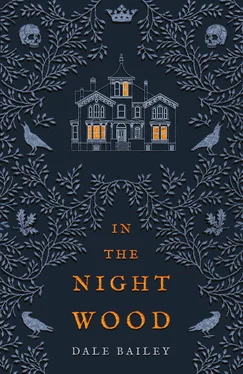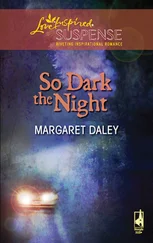Charles had never met the cousins before. He’d never met any of these people; he hadn’t even known they existed. Puttering up the winding driveway this morning in their wheezing old Honda, he’d felt like a child in a story, waking one morning to discover that he’s a prince in hiding, that his parents (his parent) were not his parents after all, but faithful retainers to an exiled king. Prince or no, the cousins — a thuggish trio of older boys clad in stylish dress clothes that put to shame his ill-fitting cords and secondhand oxford (the frayed tail already hanging out) — had taken an instant dislike to this impostor in their midst. Nor had anyone else seemed particularly enamored of Charles’s presence. Even now he could hear adult voices contending in the elegant chambers beyond the open door, Kit’s querulous and pleading, and those of his two aunts (Regan and Goneril, Kit called them) firm and unyielding.
Adult matters. Charles turned his attention to the books. Sauntering the length of a shelf, he trailed one finger idly along beside him, bump bump bump across the spines of the books, like a kid dragging a stick down a picket fence. At last, he turned and plucked down by chance from the rows of books a single volume, bound in glistening brown leather, with red bands on the spine.
Outside the door, his mother’s voice rose sharply.
One of the aunts snapped something in response.
In the stillness that followed — even the cousins had fallen silent — Charles examined the book. The supple leather boards were embossed with some kind of complex design. He studied it, mapping the pattern — a labyrinth of ridges and whorls — with the ball of his thumb. Then he opened the book. The frontispiece echoed the motif inscribed on the cover; here, he could see it clearly, a stylized forest scene: gnarled trees with serpentine roots and branches twining about one another in sinuous profusion. Twisted, and bearded with lichen, the trees projected an oddly menacing aura of sentience — branches like clutching fingers, a hollow like a screaming mouth. Strange faces, seemingly chance intersections of leaf and bough, peered out at him from the foliage: a grinning serpent, a malevolent cat, an owl with the face of a frightened child.
And on the facing page:
In the Night Wood
by
Caedmon Hollow
Looking down at the words — like the frontispiece, garlanded with foliage — Charles felt his heart quicken. The age-darkened pages smelled like a cellar of exotic spices thrown open in an airless room, and their texture, faintly ridged underneath his fingers and laid through with pale equidistant lines, felt like the latitudes of a world yet unmapped. Those sly foxlike faces, peering everywhere out at him from tangles of leaf and briar, seemed to consult among themselves, a confabulation of whispers too faint to quite discern, there and gone again in the same breath. His finger crept out to turn the page.
“Charles.”
He looked up, startled.
Kit stood in the doorway, her thin mouth compressed into a bloodless line. Staring at her, Charles saw for the first time — as with an adult’s eyes — how old she looked, how tired, how different from her immaculate sisters, lacquered to within an inch of their lives. He thought of his grandfather, that stranger in the casket who shared Kit’s jutting cheekbones and deep blue eyes. It fell upon him like a blow, that image. It nearly staggered him.
“We’re leaving, Charles. Get your things.”
He swallowed. “Okay.”
She held his gaze a moment longer. Then she was gone.
Charles started to slide the book back into its slot on the shelf — but hesitated. He felt once again that sense of tremulous significance, as if the flow of events had been shunted into a new and unsuspected channel. As if thrones and dominions more powerful than he could imagine had stepped briefly from behind some hidden curtain in the air. The room almost hummed with their presence.
He could not surrender the book, this artifact of a life that, but for Kit, could have been his own: the manicured lawns and the vast rooms and the great library most of all. (Libraries would be the lodestone of his life.) He would have to tuck it into his knapsack and spirit it out of the house.
He would have to steal it.
As this conviction took root inside him, Charles felt a surge of panic. Terror and exhilaration vibrated through him like a plucked chord.
He wanted to flee, to cast aside the book and, for the first time all day, seek human companionship. Even the unbearable cousins would do. But he could not seem to pry loose his frozen fingers. As of its own accord, the book fell open in his hands, and he found himself flipping past the frontispiece and the title page to the text itself: Chapter One.
The initial letter of the opening sentence was inset and oversized and bound in ornate runners of leaf and vine. For a moment, his inexperienced eye could not decode it. And then abruptly, the entire phrase snapped into focus.
Once upon a time, it said.
But for the book, Charles might have forgotten the entire episode. For all Kit ever spoke of it, the whole day might have been an elaborate fantasy inspired by their itinerant existence in a succession of cheap walk-up apartments, sustained by a series of minimum-wage jobs (“Fired again,” she always told him ruefully when one of them headed south) and well-meaning but feckless boyfriends, most of whom exuded a sweet-smelling haze that Charles would many years later come to recognize as the scent of pot.
But the stolen leather volume had a way of turning up anew with each fresh move — in a box of mateless socks or shoved in among the well-thumbed paperbacks on Kit’s bedroom shelf. Finally, home sick one afternoon in Baltimore — they’d only just moved; he must have been nine or ten at the time — Charles actually read it.
The story showed up in his dreams for days thereafter, a hallucinatory montage of great trees pressing close upon a woodland path, a terrified child, a horned king, his pale horse steaming at the nostrils in the midnight air. Afterward, Charles could never be quite certain whether to attribute the eidetic quality of these images to the book itself or to the feverish condition he’d been in when he read it. He meant to go back and have another look, but the pressures attendant upon being the new kid at school (he was always the new kid at school, and a bookish, nerdy kid at that) intervened.
By the time he did try to go back, two or three moves later, the book had evaporated, vanished in one of the more recent relocations. And this time it really was forgotten.
It might have stayed that way had Charles not enrolled in a seminar in Victorian nonsense literature fifteen years later. He’d been on his own for years by then (sometimes it felt like he’d always been on his own, like he’d spent more time parenting Kit than vice versa), a scholarship kid who did well enough as an undergraduate English major to snag a teaching assistantship at one of the big state Ph.D. mills. There, he divided his time between a derelict apartment in the student ghetto, cramped classrooms, where he held forth on the merits of the thesis statement to bored freshmen only four or five years his junior, and the classes he was taking, where the air was thick with intellectual posturing and professional anxiety. He’d enrolled in the nonsense seminar out of necessity, when the class he’d really wanted — a course in literary theory taught by a fading Ivy League enfant terrible who planed in once a week to teach his classes and then promptly vanished — filled up before he could get in.
So it happened that Charles — at twenty-five, still scrawny and bespectacled, still a little bit afraid — found himself in the university library one cold February evening, reading up on Edward Lear. He’d just started nodding when his eye chanced upon a footnote referencing an obscure Victorian fantasist by the name of Caedmon Hollow. Now almost entirely forgotten (Charles read), Hollow had written only a single book: In the Night Wood.
Читать дальше












